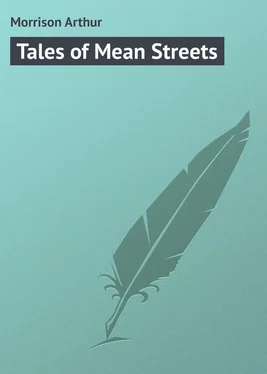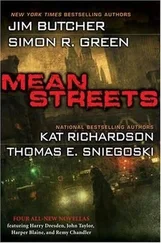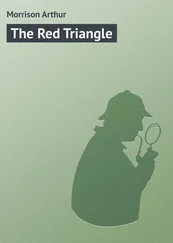Arthur Morrison - Tales of Mean Streets
Здесь есть возможность читать онлайн «Arthur Morrison - Tales of Mean Streets» — ознакомительный отрывок электронной книги совершенно бесплатно, а после прочтения отрывка купить полную версию. В некоторых случаях можно слушать аудио, скачать через торрент в формате fb2 и присутствует краткое содержание. Жанр: foreign_prose, на английском языке. Описание произведения, (предисловие) а так же отзывы посетителей доступны на портале библиотеки ЛибКат.
- Название:Tales of Mean Streets
- Автор:
- Жанр:
- Год:неизвестен
- ISBN:нет данных
- Рейтинг книги:3 / 5. Голосов: 1
-
Избранное:Добавить в избранное
- Отзывы:
-
Ваша оценка:
- 60
- 1
- 2
- 3
- 4
- 5
Tales of Mean Streets: краткое содержание, описание и аннотация
Предлагаем к чтению аннотацию, описание, краткое содержание или предисловие (зависит от того, что написал сам автор книги «Tales of Mean Streets»). Если вы не нашли необходимую информацию о книге — напишите в комментариях, мы постараемся отыскать её.
Tales of Mean Streets — читать онлайн ознакомительный отрывок
Ниже представлен текст книги, разбитый по страницам. Система сохранения места последней прочитанной страницы, позволяет с удобством читать онлайн бесплатно книгу «Tales of Mean Streets», без необходимости каждый раз заново искать на чём Вы остановились. Поставьте закладку, и сможете в любой момент перейти на страницу, на которой закончили чтение.
Интервал:
Закладка:
This is not a dirty street, taken as a whole. The widow's house is one of the cleanest, and the widow's children match the house. The one house cleaner than the widow's is ruled by a despotic Scotchwoman, who drives every hawker off her whitened step, and rubs her door handle if a hand have rested on it. The Scotchwoman has made several attempts to accommodate "young men lodgers," but they have ended in shrill rows.
There is no house without children in this street, and the number of them grows ever and ever greater. Nine-tenths of the doctor's visits are on this account alone, and his appearances are the chief matter of such conversation as the women make across the fences. One after another the little strangers come, to live through lives as flat and colorless as the day's life in this street. Existence dawns, and the doctor-watchman's door knock resounds along the row of rectangular holes. Then a muffled cry announces that a small new being has come to trudge and sweat its way in the appointed groove. Later, the trotting of little feet and the school; the midday play hour, when love peeps even into this street; after that more trotting of little feet – strange little feet, new little feet – and the scrubbing, and the squalling, and the barren flower-pot; the end of the sooty day's work; the last home-coming; nightfall; sleep.
When love's light falls into some corner of the street, it falls at an early hour of this mean life, and is itself but a dusty ray. It falls early, because it is the sole bright thing which the street sees, and is watched for and counted on. Lads and lasses, awkwardly arm in arm, go pacing up and down this street, before the natural interest in marbles and doll's houses would have left them in a brighter place. They are "keeping company"; the manner of which proceeding is indigenous – is a custom native to the place. The young people first "walk out" in pairs. There is no exchange of promises, no troth-plight, no engagement, no love-talk. They patrol the street side by side, usually in silence, sometimes with fatuous chatter. There are no dances, no tennis, no water-parties, no picnics to bring them together: so they must walk out, or be unacquainted. If two of them grow dissatisfied with each other's company, nothing is easier than to separate and walk out with somebody else. When by these means each has found a fit mate (or thinks so), a ring is bought, and the odd association becomes a regular engagement; but this is not until the walking out has endured for many months. The two stages of courtship are spoken of indiscriminately as "keeping company," but a very careful distinction is drawn between them by the parties concerned. Nevertheless, in the walking out period it would be almost as great a breach of faith for either to walk out with more than one, as it would be if the full engagement had been made. And love-making in this street is a dreary thing, when one thinks of love-making in other places. It begins – and it ends – too soon.
Nobody from this street goes to the theatre. That would mean a long journey, and it would cost money which might buy bread and beer and boots. For those, too, who wear black Sunday suits it would be sinful. Nobody reads poetry or romance. The very words are foreign. A Sunday paper in some few houses provides such reading as this street is disposed to achieve. Now and again a penny novel has been found among the private treasures of a growing daughter, and has been wrathfully confiscated. For the air of this street is unfavorable to the ideal.
Yet there are aspirations. There has lately come into the street a young man lodger who belongs to a Mutual Improvement Society. Membership in this society is regarded as a sort of learned degree, and at its meetings debates are held and papers smugly read by lamentably self-satisfied young men lodgers, whose only preparation for debating and writing is a fathomless ignorance. For ignorance is the inevitable portion of dwellers here: seeing nothing, reading nothing, and considering nothing.
Where in the East End lies this street? Everywhere. The hundred and fifty yards is only a link in a long and a mightily tangled chain – is only a turn in a tortuous maze. This street of the square holes is hundreds of miles long. That it is planned in short lengths is true, but there is no other way in the world that can more properly be called a single street, because of its dismal lack of accent, its sordid uniformity, its utter remoteness from delight.
LIZERUNT
LIZERUNT.
I. LIZER'S WOOING
Somewhere in the register was written the name Elizabeth Hunt; but seventeen years after the entry the spoken name was Lizerunt. Lizerunt worked at a pickle factory, and appeared abroad in an elaborate and shabby costume, usually supplemented by a white apron. Withal she was something of a beauty. That is to say, her cheeks were very red, her teeth were very large and white, her nose was small and snub, and her fringe was long and shiny; while her face, new-washed, was susceptible of a high polish. Many such girls are married at sixteen, but Lizerunt was belated, and had never a bloke at all.
Billy Chope was a year older than Lizerunt. He wore a billycock with a thin brim and a permanent dent in the crown; he had a bobtail coat, with the collar turned up at one side and down at the other, as an expression of independence; between his meals he carried his hands in his breeches pockets; and he lived with his mother, who mangled. His conversation with Lizerunt consisted long of perfunctory nods; but great things happened this especial Thursday evening, as Lizerunt, making for home, followed the fading red beyond the furthermost end of Commercial Road. For Billy Chope, slouching in the opposite direction, lurched across the pavement as they met, and, taking the nearer hand from his pocket, caught and twisted her arm, bumping her against the wall.
"Garn," said Lizerunt, greatly pleased: "le' go!" For she knew that this was love.
"Where yer auf to, Lizer?"
"'Ome, o' course, cheeky. Le' go;" and she snatched – in vain – at Billy's hat.
Billy let go, and capered in front of her. She feigned to dodge by him, careful not to be too quick, because affairs were developing.
"I say, Lizer," said Billy, stopping his dance and becoming business-like, "goin' anywhere Monday?"
"Not along o' you, cheeky; you go 'long o' Beller Dawson, like wot you did Easter."
"Blow Beller Dawson; she ain't no good. I'm goin' on the Flats. Come?"
Lizerunt, delighted but derisive, ended with a promise to "see." The bloke had come at last, and she walked home with the feeling of having taken her degree. She had half assured herself of it two days before, when Sam Cardew threw an orange peel at her, but went away after a little prancing on the pavement. Sam was a smarter fellow than Billy, and earned his own living; probably his attentions were serious; but one must prefer the bird in hand. As for Billy Chope, he went his way, resolved himself to take home what mangling he should find his mother had finished, and stick to the money; also, to get all he could from her by blandishing and bullying, that the jaunt to Wanstead Flats might be adequately done.
There is no other fair like Whit Monday's on Wanstead Flats. Here is a square mile and more of open land where you may howl at large; here is no danger of losing yourself, as in Epping Forest; the public houses are always with you; shows, shies, swings, merry-go-rounds, fried fish stalls, donkeys, are packed closer than on Hampstead Heath; the ladies' tormentors are larger, and their contents smell worse, than at any other fair. Also, you may be drunk and disorderly without being locked up, – for the stations won't hold everybody, – and when all else has palled, you may set fire to the turf. Hereinto Billy and Lizerunt projected themselves from the doors of the Holly Tree on Whit Monday morning. But through hours on hours of fried fish and half-pints both were conscious of a deficiency. For the hat of Lizerunt was brown and old; plush it was not, and its feather was a mere foot long, and of a very rusty black. Now, it is not decent for a factory girl from Limehouse to go bank-holidaying under any but a hat of plush, very high in the crown, of a wild blue or a wilder green, and carrying withal an ostrich feather, pink or scarlet or what not; a feather that springs from the fore part, climbs the crown, and drops as far down the shoulders as may be. Lizerunt knew this, and, had she had no bloke, would have stayed at home. But a chance is a chance. As it was, only another such hapless girl could measure her bitter envy of the feathers about her, or would so joyfully have given an ear for the proper splendor. Billy, too, had a vague impression, muddled by but not drowned in half-pints, that some degree of plush was condign to the occasion and to his own expenditure. Still, there was no quarrel; and the pair walked and ran with arms about each other's necks; and Lizerunt thumped her bloke on the back at proper intervals; so that the affair went regularly on the whole: although, in view of Lizerunt's shortcomings, Billy did not insist on the customary exchange of hats. Everything, I say, went well and well enough until Billy bought a ladies' tormentor and began to squirt it at Lizerunt. For then Lizerunt went scampering madly, with piercing shrieks, until her bloke was left some little way behind, and Sam Cardew, turning up at that moment and seeing her running alone in the crowd, threw his arms about her waist and swung her round him again and again, as he floundered gallantly this way and that, among the shies and the hokey-pokey barrows.
Читать дальшеИнтервал:
Закладка:
Похожие книги на «Tales of Mean Streets»
Представляем Вашему вниманию похожие книги на «Tales of Mean Streets» списком для выбора. Мы отобрали схожую по названию и смыслу литературу в надежде предоставить читателям больше вариантов отыскать новые, интересные, ещё непрочитанные произведения.
Обсуждение, отзывы о книге «Tales of Mean Streets» и просто собственные мнения читателей. Оставьте ваши комментарии, напишите, что Вы думаете о произведении, его смысле или главных героях. Укажите что конкретно понравилось, а что нет, и почему Вы так считаете.












